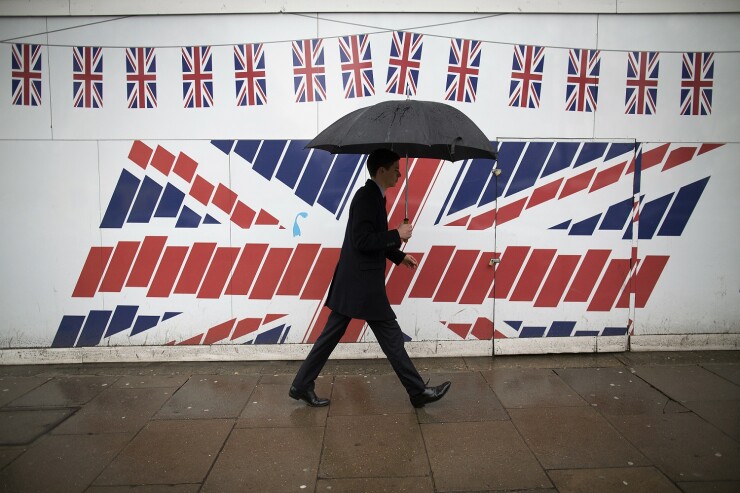(Bloomberg) -- Every investor fears the tell-tale signs of a dividend that's about to get slashed. Maybe in a post-Brexit world it's time to get worried about payouts going up.
The U.K.'s biggest general insurer, Aviva, is aiming to hike its dividend payout ratio to 50% for next year "and beyond." That compares to 42% last year and 37% in 2014. Despite admitting that earnings growth is "uncertain" — perhaps an understatement given the current market gyrations — Aviva wants to keep rewarding shareholders with a bigger piece of the pie regardless.
Ultra-low interest rates and investors' desperate hunt for yield have skewed incentives in favor of keeping shareholders sweet.
"Dividend is paramount," it said on Wednesday.
Read more:
Reliable capital return seems an odd message to send right now. Aviva's confidence may be based on a sound balance sheet, and paying out half your profit is hardly high-stakes gambling. But this message is surely at risk of sounding over-optimistic if rocky markets get worse. If earnings fall rather than rise this year (with analyst forecasts suggesting adjusted earnings will indeed drop) prudence might better serve investors.

Aviva has form here. It hiked its dividend in 2007 and kept it steady in 2008 amid the fires of the great financial crisis. While the finance sector is in better shape today, it's hard to shake that feeling of crisis deja vu, especially considering Aviva was also one of three U.K. groups to halt investor withdrawals from real-estate funds this week — an uncomfortable reminder again of what happened almost a decade ago.
The problem goes well beyond Aviva, though. Ultra-low interest rates and investors' desperate hunt for yield have skewed incentives in favor of keeping shareholders sweet. Blue-chip U.K. companies' dividend payout ratios exceeded 100% last year for the first time since 2008, according to Bloomberg data. GlaxoSmithKline, for one, has the highest such ratio among the world's 10 biggest drug makers, according to Bloomberg analysis in March. In the financial sector, with capital requirements getting tougher and growth hard to come by, the ability to pay a growing dividend is the ultimate badge of investor approval.
For big international companies, the likelihood is that the post-Brexit combination of a fall in the British pound, a cut to corporate tax and lower-for-longer borrowing costs will serve only to skew incentives further to keep revving up payouts. That's viewed traditionally as good for yield hunters.
But the risk is not just that some companies will end up delaying inevitable and painful dividend cuts. It's also that mistakes from the past will be repeated through recycling yet more cash into the stock market rather than reinvesting. While free cash flow for STOXX Europe 600 companies has soared since 2012, capital expenditures have barely budged. Whatever the hopes of policy-makers, the prospect of yet more support from central banks and even lower corporate taxes probably won't change that.
One thing Brexit has reminded us is that politics is never entirely divorced from the market. Even the most red-blooded fund managers at Pimco and Bank of America are talking about the protest against inequality and how it will weigh on portfolios. How companies re-allocate profits to invest and create jobs is surely part of that — and some shareholders will need to change their thinking as a result.





